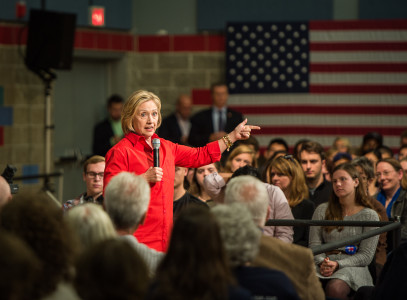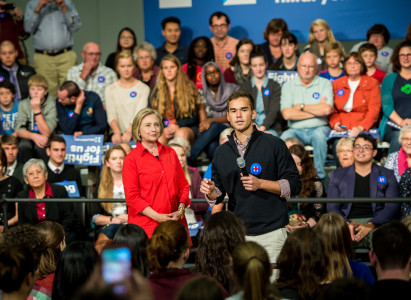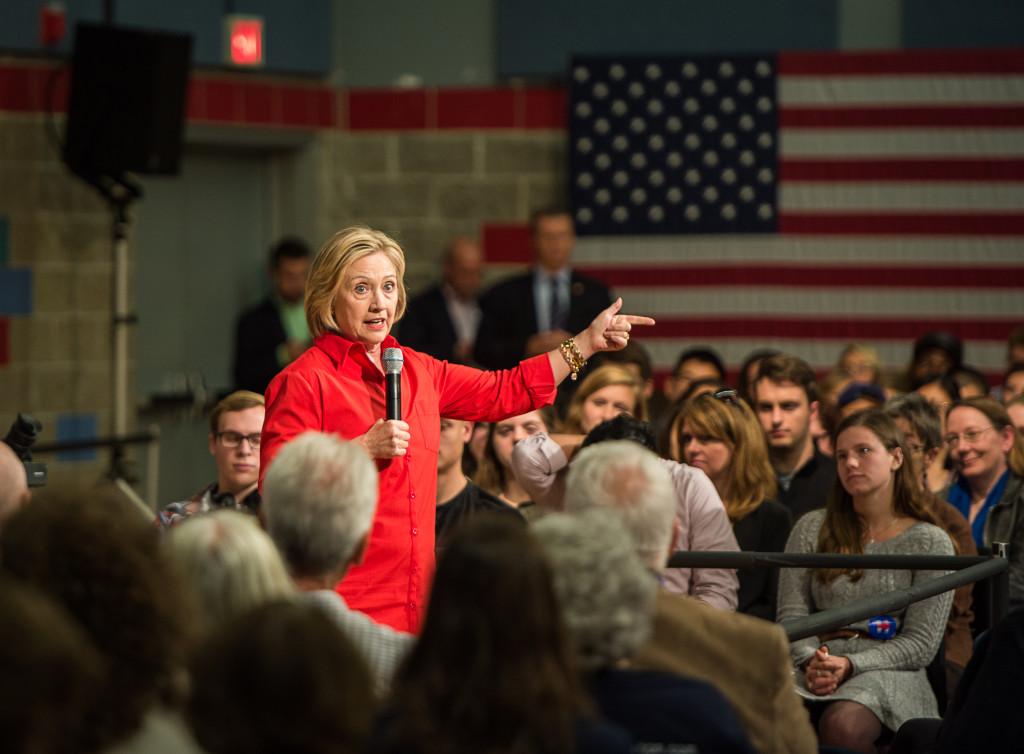
JON SUNDBY, News Editor
sundbyjo17@grinnell.edu
On Tuesday, Nov. 3, the line outside the Harris Center stretched well into the North Loggia. Students and local Iowans had been queued up for hours before the doors opened, hoping to receive good seats to see presidential candidate Hillary Clinton speak.
The current frontrunner for the democratic nomination, Clinton is the last of the three major Democratic candidates to come to Grinnell. Her visit came at a pivotal time in her own campaign, as recent performances at the Benghazi testimony and the first debate increased her lead in the polls.
Word of Clinton’s visit came rather abruptly, with students, faculty and locals receiving only five days’ advance notice. Even leaders of the campus group, Grinnellians for Hillary, did not know about the event until last Friday, Oct. 30, along with everyone else. After the group was briefed, they were asked to promote the event on campus and even provide a speaker to introduce Hillary.
“I’m introducing her, so I’m incredibly nervous about that,” said David Leitson ’16, a leader of Grinnellians for Hillary.
Several hours after doors opened to Harris, Leitson entered with Clinton and gave a brief introduction that centered on his own experience growing up in a diverse Chicago suburb.
“Growing up in an economically and racially diverse suburb, Oak Park, diversity was genuine, it was tangible. Black kids played with White kids, played with Latino kids, we all played together… [but] as I got older I saw my peers get sorted into classrooms that seemed predetermined by the color of our skin or the wealth of our parents,” Leitson said in his introduction.

After his speech, Leitson passed the microphone onto Clinton, who throughout her speech touched on many related subjects. As the format of the event was a Town Hall, Clinton’s speech took less than thirty minutes while her question and answer session lasted another forty-five. In her speech, Clinton emphasized her extensive experience in advocacy and public service, which extends from working with the Children’s Defense Fund after graduating law school to, most recently, Secretary of State.
“I think she really drove home her experience. She knows a lot, and I think people often forget how much experience she has. [Tonight] really reminded me of that,” said Sophia Stern ’19.
As the questions began, almost all of them focused the former Secretary on the specifics of her platform. Several Grinnell students were able to ask questions, as well as some locals and even a couple junior members of the audience. Although the questions spanned the scope of several policy areas, there seemed to be broad consensus amongst the audience that, on the whole, Clinton answered them knowledgably.
“The breadth of her knowledge, the depth of her knowledge. She was questioned on everything from Native Americans, the development of Africa, the prisons to student loans and she was up on all of those subjects,” commented Professor Wayne Moyer, Political Science, on what made Clinton stand out from past visits of presidential candidates to the College.
Clinton also often referred not only to her own policy proposals, but also to those of the Republicans, putting the choice in stark contrast for her listeners. In both her speech and her answers, Clinton described a political enemy that sought to dismantle the programs, regulations and entitlements that she had worked so hard to implement.
“This election is between those of us who want to build on the progress we’ve made, like the Affordable Care Act, like cracking down on Wall Street through Dodd Frank, like making it possible for people to feel, once again, that they have a chance for a future and those who want to go back to where all this began,” said Clinton, adding that if the Republicans won in 2016 it would be “the biggest U-turn that we will have seen in American history.”
As the frontrunner for the Democratic nomination by a wide margin, Clinton seemed to focus more on her potential contest with the Republicans rather than on her competition within the Democratic Party. Despite the consensus that her campaign has been trying to foster, however, there is considerable dissent within the Party, which can especially be seen here at Grinnell. Much of the criticism to her candidacy centers on her use of Super PACs and corporate money to finance her campaign.
“Everything about her history and her campaign indicates that her presidency would be guided by the goals of corporate America,” said Rosie O’Brien ’16.
O’Brien and Jacob Metz-Lerman ’17, along with other students, staged an act of protest at the end of Clinton’s event by throwing fake paper money in the air with slogans printed on the back such as “Billionaires for Hillary.” Organizers said that the protest was conducted in order to start a dialogue about the potential issues of a Clinton presidency.
“In general, I noticed that no one was leading a voice of opposition to Hillary coming to campus and I just wanted to make sure that this was a forum that was open for people who object to Hillary Clinton for President, especially now that there is a viable alternative,” O’Brien said.
Some students who weren’t involved in the protest were also slightly disappointed with Clinton’s answers, commenting that while she came off as energetic and knowledgeable, the content of her answers was at times a little vague.
Grisel Hernandez ‘17, was one of the students who was dissatisfied with Clinton’s answer to their question. Hernandez asked about Clinton’s hypothetical policies towards Latin America in the context of the Drug War. “She basically said ‘yes, that’s a problem’ and then spoke about incarceration, substance abuse, lack of mental health facilities, etc, but she never brought in foreign policy,” lamented Hernandez.
After her time on stage, Clinton stayed for a while in the Harris Center to take pictures and talk with her audience personally. While the candidate has received some criticism in the past for coming across as too cold, no one could accuse her of such on Tuesday, as evidenced by the constant smiles that she exchanged with students eager to take a selfie with her.
As the date of the Iowa caucus is not until February, the race for the Democratic nomination is still wide open. Yet, recent political victories during the first Debate and the Benghazi hearing have placed Clinton in a sizable lead over her competitors and her performance on Tuesday night undoubtedly got the campus talking about the possibility of a Clinton presidency.
“She’s had some bad weeks, and she has to recover from that, but a performance like this is a pretty good recovery,” Moyer said.





























































